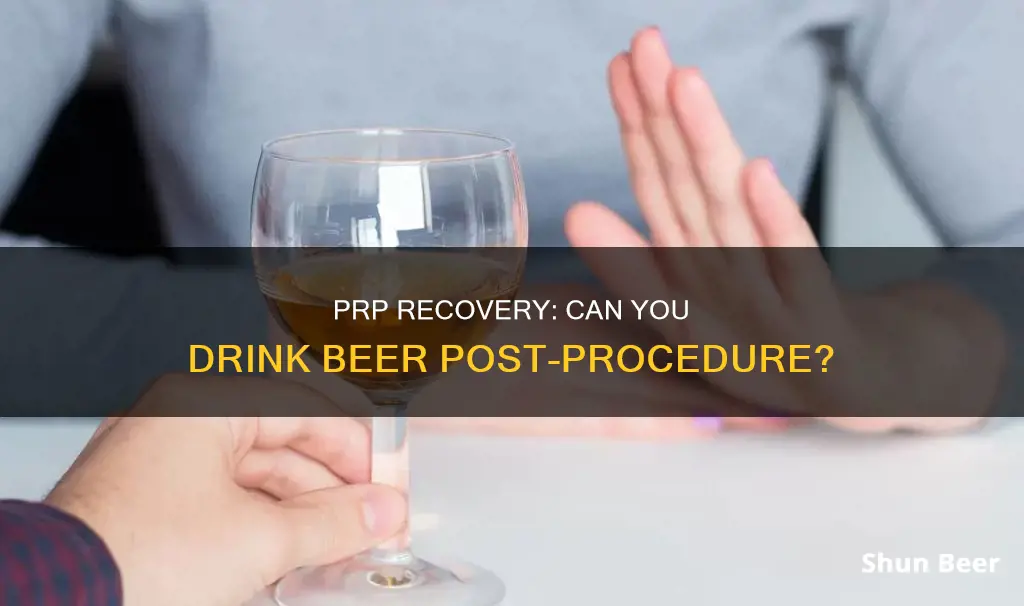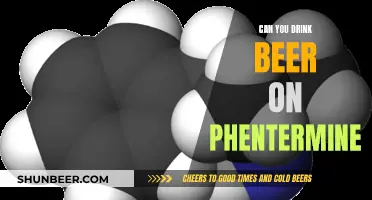
Platelet-rich plasma (PRP) therapy is a safe and minimally invasive treatment that harnesses the power of blood platelets to stimulate tissue regeneration and wound healing. It is often used to treat hair loss, joint pain, and various injuries. While PRP therapy is effective, patients must follow certain aftercare instructions to ensure optimal results and a smooth recovery. One of the key reminders for patients is to avoid alcohol consumption after the injection. Alcohol is a known blood thinner and can interfere with the body's natural healing process, leading to increased bruising and inflammation. It can also impair platelet function, which is crucial for the success of PRP treatment. Therefore, it is recommended to refrain from heavy drinking for at least one week before and after PRP therapy.
| Characteristics | Values |
|---|---|
| Alcohol consumption before PRP treatment | Should be avoided for at least 2 days or up to a week before the procedure |
| Alcohol consumption after PRP treatment | Should be avoided for at least 1 day or up to a week after the procedure |
| Effect of alcohol consumption on PRP treatment | Alcohol can cause blood thinning, affect the body's natural healing process, worsen bruising and inflammation, and impair platelet function |
What You'll Learn
- Alcohol can cause blood thinning, impacting the body's healing process
- Avoid drinking heavily for at least a week before and after PRP therapy
- Alcohol negatively affects platelet function, which is key to PRP treatment
- Alcohol can cause dehydration, which may lead to extended recovery times
- Alcohol may cause increased bleeding during the procedure

Alcohol can cause blood thinning, impacting the body's healing process
Platelet-rich plasma (PRP) therapy is a safe and minimally invasive treatment that harnesses the power of blood platelets to stimulate tissue regeneration and wound healing. It is often used to treat chronic pain, musculoskeletal disorders, joint injuries, hair loss, and skin renewal.
After undergoing PRP therapy, it is recommended to avoid alcohol consumption for a certain period. This is because alcohol can cause blood thinning, which interferes with the body's natural healing process. Here are the reasons why alcohol consumption can impact the body's healing process:
Reduction in Platelet Function and Count
Alcohol can decrease platelet activation and aggregation, impairing their ability to clump together and form clots. This reduction in platelet function and count can hinder the body's healing process, which relies on platelets to promote blood clotting and provide growth factors for tissue repair and new cell growth.
Prolonged Healing and Increased Inflammation
Alcohol acts as a vasodilator, which means it widens the blood vessels and increases blood flow in the treated area. This can lead to increased bruising and inflammation, as more blood leaks out of the vessels. As a result, the recovery time may be prolonged due to the body's increased susceptibility to bruising.
Dehydration
While alcohol may temporarily quench thirst, it is a diuretic that causes fluids to pass quickly through the renal system. Dehydration resulting from alcohol consumption can lead to increased tissue and cell damage, fatigue, and a prolonged recovery time, disrupting the body's natural healing process.
Long-Term Health Risks
Excessive alcohol consumption is associated with long-term health risks, including cardiovascular problems such as hypertension, coronary heart disease, myocardial infarction (heart attack), arrhythmias, and stroke. These conditions can have detrimental effects on the body and impact its ability to heal and recover from injuries or medical procedures.
In conclusion, it is important for patients who have undergone PRP therapy to refrain from alcohol consumption for at least a week before and after the procedure. This is to ensure optimal healing and to avoid any negative impact on the treatment's effectiveness.
The Magic Behind Beer Glycol Systems: Keeping Beer Cold
You may want to see also

Avoid drinking heavily for at least a week before and after PRP therapy
Drinking heavily before and after PRP therapy is not recommended. Alcohol is known to thin the blood and interfere with the body's healing process, which can lead to increased bruising and inflammation. It can also negatively affect platelet function, reducing their count and viability, and prolonging the healing process. Therefore, it is advisable to avoid heavy drinking for at least a week before and after PRP therapy to ensure optimal results and a smooth recovery.
PRP, or Platelet-Rich Plasma, is a safe and effective treatment for various medical problems, including arthritis, tendon disorders, musculoskeletal injuries, sports injuries, and degenerative conditions like osteoarthritis. It is a minimally invasive procedure with little to no downtime, where a patient's blood is drawn, spun in a centrifuge to separate the platelets, and then injected back into the affected area to promote healing.
While PRP treatment is generally safe and simple, there are some aftercare instructions that patients should follow for optimal results. In addition to limiting alcohol consumption, patients should also stay hydrated, get plenty of rest, and avoid strenuous activity for the first few days after the procedure.
It is worth noting that some medical professionals advise against drinking any alcohol for two days before and after PRP therapy, as it can increase the risk of bleeding and bruising during the procedure. However, according to some doctors, drinking a moderate amount of alcohol after PRP injections should not affect the results, although it may cause slight water retention and increased swelling.
The Magic of Beer Dispensers: How Do They Work?
You may want to see also

Alcohol negatively affects platelet function, which is key to PRP treatment
Platelet-rich plasma (PRP) therapy is a safe and minimally invasive treatment that harnesses the power of blood platelets to stimulate tissue regeneration and wound healing. It is often used to treat chronic pain, musculoskeletal disorders, joint injuries, hair loss, and skin renewal. The treatment involves isolating platelets from red and white blood cells, as platelets contain multiple growth factors and proteins that are crucial for repairing tissues.
- Alcohol is a known blood thinner and can interfere with the body's natural healing process, leading to increased bruising and inflammation.
- Alcohol impairs platelet function by decreasing platelet activation and aggregation and affecting their response to other proteins and enzymes. This can compromise the results of PRP injections, as the treatment relies on the body's ability to heal and the role of platelets in this process.
- Alcohol can cause a reduction in platelet count and viability, which may hinder the maximum healing capabilities of PRP injections. This may result in suboptimal outcomes and a decrease in desired results, such as hair growth or pain relief.
- Alcohol consumption can prolong bruising and inflammation after treatment. As a vasodilator, alcohol widens blood vessels and increases blood circulation in the treated area, leading to increased bruising.
- Alcohol promotes dehydration, as it is a diuretic that causes fluids to pass quickly through the renal system. Dehydration can cause additional cell and tissue damage and prolong the recovery process.
- Alcohol can lead to long-term health issues, including weakened immune function and platelet viability. This can result in thinning hair, inflammation, and poor joint health.
To ensure optimal results and a smooth recovery from PRP treatment, it is recommended to avoid heavy drinking for at least one week before and after the procedure. Patients should also be mindful of their alcohol consumption in the long term, as it can impact the effectiveness of the treatment and their overall health.
Beer Trading: How Does It Work?
You may want to see also

Alcohol can cause dehydration, which may lead to extended recovery times
Drinking alcohol can cause dehydration, which in turn may lead to extended recovery times after PRP treatment.
PRP, or platelet-rich plasma, is a treatment that harnesses the power of blood platelets to stimulate tissue regeneration and wound healing. It is often used to treat chronic pain, musculoskeletal disorders, and joint injuries, and can also be used to promote hair growth and skin renewal.
After a PRP injection, it is important to keep hydrated. Alcohol is a diuretic, which means it increases urination and fluid loss. As a result, alcohol consumption can lead to dehydration, which may prolong recovery time and interfere with the body's natural healing processes. Dehydration can cause fatigue and prolong the healing process, leading to increased bruising and inflammation.
To ensure a smooth recovery after PRP treatment, it is recommended to increase water intake and avoid alcohol consumption for at least 3 to 7 days following the injections. By staying hydrated, patients can support the body's healing process and reduce the risk of dehydration-related complications.
In addition to dehydration, alcohol consumption can also negatively impact platelet function, reducing their healing ability and prolonging the recovery process. Therefore, it is crucial for patients to avoid heavy drinking before and after PRP therapy to optimize their treatment outcomes and recovery experience.
Beer Mail: Shipping Alcohol Straight to Your Doorstep
You may want to see also

Alcohol may cause increased bleeding during the procedure
Alcohol consumption before a PRP injection is not recommended as it may cause increased bleeding during the procedure. This is because alcohol is a blood thinner and can affect the body's natural healing process. It can also worsen bruising and inflammation and impair platelet function, which is vital to the success of PRP treatment.
PRP, or Platelet-Rich Plasma, is a treatment that uses the patient's own blood platelets to stimulate wound healing and tissue regeneration. The blood is drawn from the patient and then spun in a centrifuge to separate the platelets from the other blood cells. The platelets are then injected back into the patient's body to promote healing.
As alcohol can affect platelet function and increase the risk of bleeding and bruising, it is typically recommended that patients avoid drinking alcohol for at least one week before and after PRP therapy. This will ensure optimal results and a smooth recovery.
In addition to alcohol, patients should also avoid certain medications, herbal supplements, and strenuous activity after PRP treatment. It is also important to stay hydrated and increase water intake to aid in the recovery process.
The Beer Hall Putsch: What If It Succeeded?
You may want to see also







